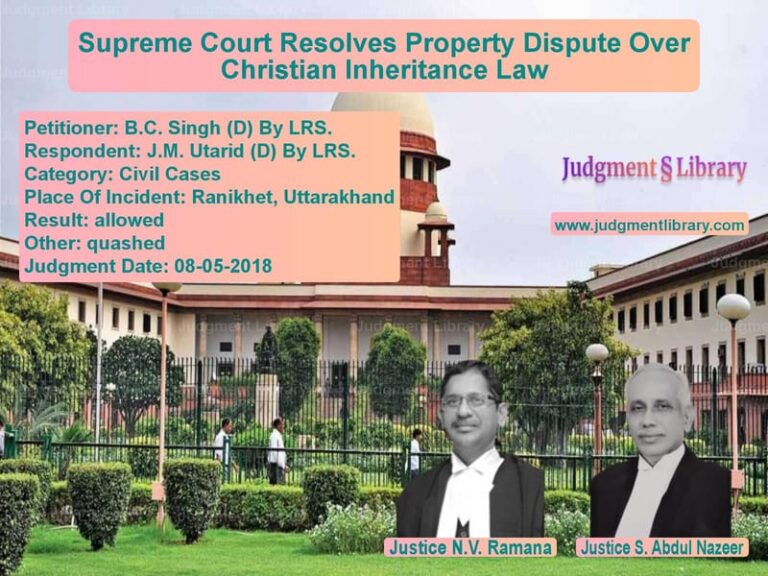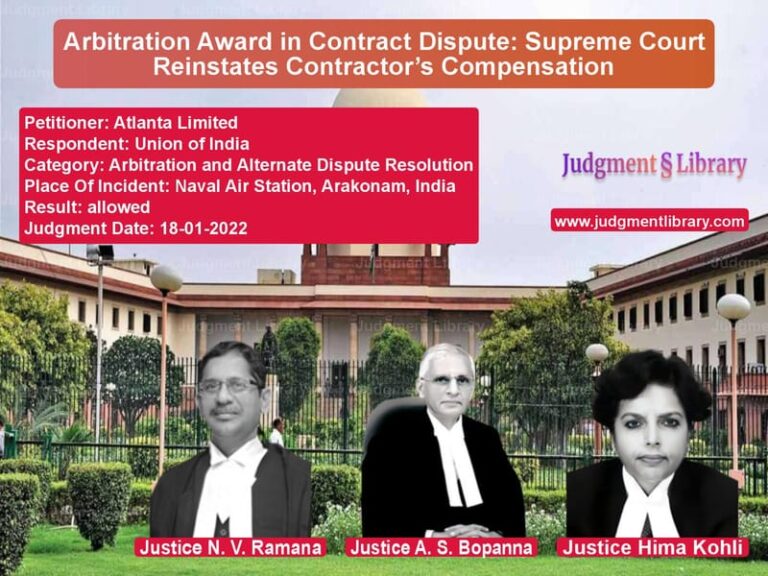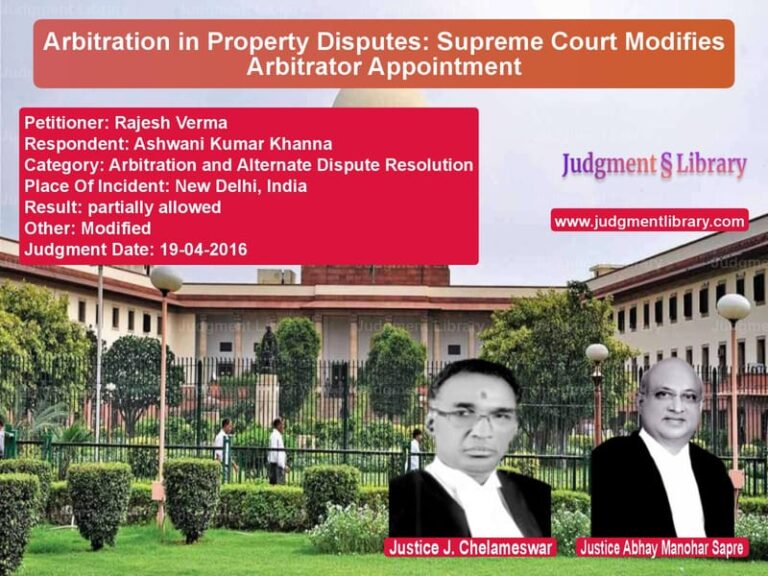Retrospective Application of Benami Transactions Act: Supreme Court’s Landmark Judgment
The case of Union of India & Anr. vs. M/s. Ganpati Dealcom Pvt. Ltd. revolves around the crucial legal question of whether the Benami Transactions (Prohibition) Amendment Act, 2016, could be applied retrospectively. The Supreme Court delivered a landmark judgment striking down the retrospective application of the Act, ruling that it cannot be used to prosecute transactions that occurred before its enforcement.
Background of the Case
The dispute began when M/s. Ganpati Dealcom Pvt. Ltd., a private entity, was accused of engaging in a benami transaction by purchasing property in 2011. Following the enactment of the Benami Transactions (Prohibition) Amendment Act, 2016, authorities sought to apply the Act retrospectively and confiscate the property. The company challenged this action before the High Court, which ruled in its favor, stating that the 2016 Act could not be applied to past transactions. Dissatisfied with this ruling, the Union of India appealed before the Supreme Court.
Legal Issues Before the Court
The Supreme Court examined the following key legal issues:
- Can the Benami Transactions (Prohibition) Amendment Act, 2016, be applied to transactions conducted before its enactment?
- Does the retrospective application of the Act violate constitutional protections under Article 20(1) of the Indian Constitution?
- Are the penalties introduced in the 2016 Amendment Act punitive or regulatory?
- What are the legal implications of striking down the retrospective application of the Act?
Arguments Presented
Petitioner’s (Union of India) Arguments
- The Union of India contended that the original Benami Transactions (Prohibition) Act, 1988, already made benami transactions illegal, and the 2016 amendment merely provided an enhanced mechanism for enforcement.
- They argued that since benami transactions were always unlawful, prosecuting past transactions under the 2016 Act did not amount to retrospective punishment.
- The government maintained that confiscation of property under the Act was a civil consequence, not a criminal penalty, and therefore did not violate Article 20(1) of the Constitution.
- They also stated that allowing past benami transactions to remain unpunished would defeat the purpose of the 2016 amendments, which were aimed at curbing black money and improving financial transparency.
Respondent’s (M/s. Ganpati Dealcom Pvt. Ltd.) Arguments
- The respondent argued that the 2016 Act introduced significant changes, including harsher penalties and new definitions of benami transactions.
- They contended that applying these new provisions retrospectively would amount to imposing a criminal penalty for past actions, violating Article 20(1) of the Constitution.
- The respondent pointed out that prior to the 2016 amendment, there was no clear procedure for prosecution or confiscation of properties, and individuals had no reasonable expectation that their transactions could later be declared illegal.
- They urged the Court to uphold the High Court’s ruling that the 2016 Act should apply prospectively and not retrospectively.
Supreme Court’s Observations
On the Nature of the 2016 Amendment
The Supreme Court, comprising Justice N.V. Ramana and Justice Krishna Murari, carefully examined the provisions of the 2016 Act. The Court held that the amendment introduced new definitions and significantly enhanced the penalties for benami transactions.
“The 2016 Act fundamentally alters the nature of the original 1988 Act by introducing stringent punitive measures and a new mechanism for confiscation, thereby making its application to past transactions unconstitutional.”
On the Violation of Article 20(1)
The Court ruled that applying the 2016 Act retrospectively would violate the principle of non-retroactivity under Article 20(1) of the Constitution, which states that no person shall be convicted of an offense except for a violation of a law in force at the time of the commission of the act.
“A penal statute cannot be applied retrospectively to impose a liability that did not exist at the time of the transaction. The retrospective application of the 2016 Act would amount to an ex post facto law, which is prohibited under Article 20(1).”
On the Confiscation of Property
The Court rejected the argument that confiscation under the 2016 Act was merely a civil consequence and not a penalty. It observed:
“The confiscation of property under the 2016 Amendment Act is not merely a civil forfeiture but a punitive measure with serious consequences. Retrospective application of such a provision is impermissible.”
On the Legislative Intent
The Supreme Court clarified that while the government’s intention to curb benami transactions was valid, it must do so within constitutional limits.
“The power to enact laws does not include the power to retrospectively criminalize past conduct in a manner that violates fundamental rights. The legislature cannot turn an innocent act into an offense after it has been committed.”
Judgment and Its Implications
The Supreme Court ruled in favor of M/s. Ganpati Dealcom Pvt. Ltd. and held that the retrospective application of the Benami Transactions (Prohibition) Amendment Act, 2016, was unconstitutional. The key directives of the judgment were:
- The 2016 Act can only apply prospectively from November 1, 2016, and not to transactions conducted before that date.
- The government cannot prosecute individuals for benami transactions that took place prior to the enforcement of the 2016 Act.
- The judgment safeguards property rights and prevents the arbitrary application of penal provisions.
Significance of the Judgment
- Protects Constitutional Rights: The ruling upholds the fundamental right against retrospective penalization under Article 20(1).
- Ensures Legal Certainty: The decision provides clarity on the applicability of the Benami Transactions Act, ensuring that individuals are not prosecuted for past actions based on new laws.
- Limits Government Overreach: The judgment prevents the arbitrary and retrospective application of stringent laws, reinforcing legal stability.
Conclusion
The Supreme Court’s ruling in Union of India & Anr. vs. M/s. Ganpati Dealcom Pvt. Ltd. is a landmark decision that upholds constitutional safeguards against retrospective punishment. By striking down the retrospective application of the 2016 Act, the Court has reinforced the principle that penal laws must apply prospectively and must not create liabilities for past actions. This ruling serves as a crucial precedent in interpreting amendments related to financial regulations and property laws in India.
Petitioner Name: Union of India & Anr..Respondent Name: M/s. Ganpati Dealcom Pvt. Ltd..Judgment By: Justice N.V. Ramana, Justice Krishna Murari.Place Of Incident: Calcutta.Judgment Date: 22-08-2022.
Don’t miss out on the full details! Download the complete judgment in PDF format below and gain valuable insights instantly!
Download Judgment: union-of-india-&-anr-vs-ms.-ganpati-dealcom-supreme-court-of-india-judgment-dated-22-08-2022.pdf
Directly Download Judgment: Directly download this Judgment
See all petitions in Fundamental Rights
See all petitions in Constitution Interpretation
See all petitions in Legislative Powers
See all petitions in Judgment by N.V. Ramana
See all petitions in Judgment by Krishna Murari
See all petitions in allowed
See all petitions in supreme court of India judgments August 2022
See all petitions in 2022 judgments
See all posts in Constitutional Cases Category
See all allowed petitions in Constitutional Cases Category
See all Dismissed petitions in Constitutional Cases Category
See all partially allowed petitions in Constitutional Cases Category







